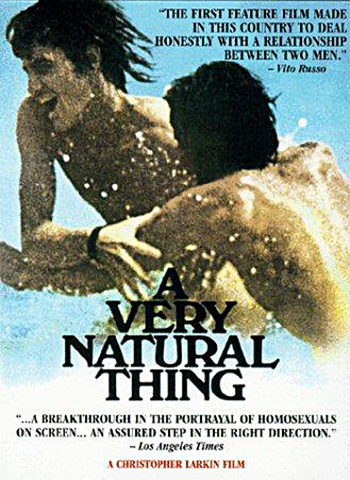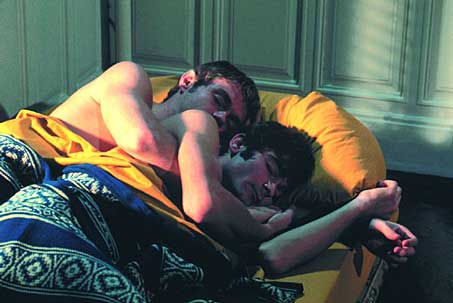 A Very Natural Thing
A Very Natural Thing
Directed by Christopher Larkin
Written by Joseph Coencas and Christopher Larkin
Released June 26, 1974
Drama (romance)
80 min.
Review by Stephen O. Murray
January 8, 2017.
A Very Natural Thing (1974), produced and directed by Chris Larkin, who made no other movies, is a historical curiosity. In that Midnight Cowboy (1969) had been rated X, it is surprising that with recurrent (if not prurient) full-frontal male nudity A Very Natural Thing was rated R.
Aside from the full-frontal male nudity (that remains rare four-plus decades later), the movie pioneered in showing gay men wrestling with relationship problems rather than tormented about being homosexual (contrast The Boys in the Band from 1970). After some interview footage of lesbians and gay men, the movie shows its protagonist, David [Robert Markl], leaving the monastery where he has been a monk for two+plus years. He went there (to an all-male environment) to escape from his homosexual yearnings, but realized he was not made for celibacy. Now (the movie’s present, the 1972–73 school year) he works as a junior high English teacher, not a job in which coming out is feasible.
 At a Manhattan gay bar he is cruised by an advertising executive, Mark [Curt Gareth] in a loud plaid sports coat, white shirt, and tie and goes home with him. Mark has a lot more experience than David tricking, but neither has previously attempted a long-term relationship. From early on, it is clear that David is a nester and Mark a player, that Mark is not going to stop tricking, and that David does not want an open relationship. Mark explains that he is not a romantic, not traditional. Rather he is liberated. (Neither is “political.”)
At a Manhattan gay bar he is cruised by an advertising executive, Mark [Curt Gareth] in a loud plaid sports coat, white shirt, and tie and goes home with him. Mark has a lot more experience than David tricking, but neither has previously attempted a long-term relationship. From early on, it is clear that David is a nester and Mark a player, that Mark is not going to stop tricking, and that David does not want an open relationship. Mark explains that he is not a romantic, not traditional. Rather he is liberated. (Neither is “political.”)
The low point of the movie is a very stilted conversation about relationships following dinner at the apartment of a friend of David’s (Mark does not appear to have friends, only tricks). After trying an orgy (that could well have warranted a NC-17 rating, the X’s having been retired as too good advertising) and a walk through a bathhouse (with horror movie music), David is the one who leaves. (Well, he had moved into what had been Mark’s apartment, and the name on the lease there was surely Mark’s.)
At the 1973 Gay Freedom Day / Christopher Street Parade (in transition to “Pride Day”), David is cruised and chatted up by Jason [Bo White]. Jason had married a woman [Deborah Trowbridge] and sired a daughter. His divorce will soon be final, though his wife has not given up hopes of getting back together. She wants him to join her family the Labor Day Weekend, but he has made plans to go to Cape Cod with David.
Traumatized by the failure of his relationship with Mark (though Mark tells David that he wants to suck David’s dick when they are on a Ferris Wheel), David is the one who holds back emotionally and thwarts Jason’s entreaties to start living together.
The lyrical ending of the naked David and Jason running down a sand dune (dicks bouncing) and into the water—the source of the poster image—indicates that there is hope for this pairing. It is the most cinematic part of an often talky movie, though one that shows the gay Manhattan world (and its Fire Island satellite) of 1973, after Stonewall, before clonedom was full-fledged. This documentary aspect provides the main interest of the movie, along with showing that at the dawn of what Brad Gooch called “the golden age of promiscuity,” there were gay men trying to work out being open and having a lasting relationship (what would be Queer as Folk territory).
 Though one of the interviewees says that homosexuality is “a very natural thing,” especially in our retrospect, I think the original title, As Long As Possible, was better. The movie and its characters take the naturalness of “unnatural love” for granted, so the title makes it sound like it will be preachy, which it mostly is not (though the incongruously included interview footage sort of is). The title may have reduced the movie’s draw for a gay audience that, like Mark, wanted to be liberated, not settle down and live happily ever after with one man. Mainstream critics, however, had not accepted the title’s claim and joined the condescension of the unhip (Gay wannabe Love Story, which Mark parodies by quipping “Love means never having to say you’re in love”).
Though one of the interviewees says that homosexuality is “a very natural thing,” especially in our retrospect, I think the original title, As Long As Possible, was better. The movie and its characters take the naturalness of “unnatural love” for granted, so the title makes it sound like it will be preachy, which it mostly is not (though the incongruously included interview footage sort of is). The title may have reduced the movie’s draw for a gay audience that, like Mark, wanted to be liberated, not settle down and live happily ever after with one man. Mainstream critics, however, had not accepted the title’s claim and joined the condescension of the unhip (Gay wannabe Love Story, which Mark parodies by quipping “Love means never having to say you’re in love”).
©2017, Stephen O. Murray

